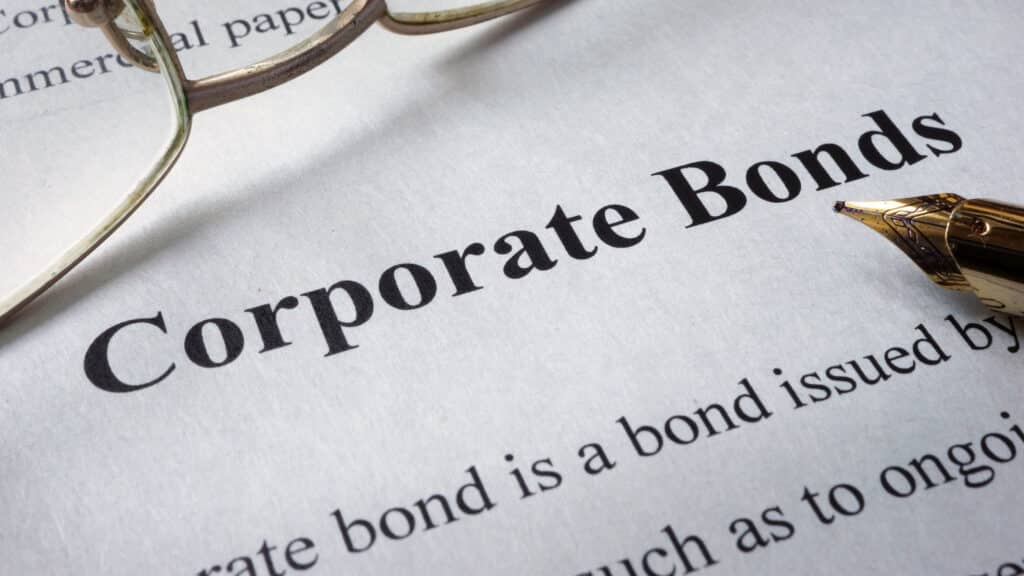Invest in Corporate Bonds
Corporate bonds are debt securities that are loans to a company in return for a stream of interest payable over the fixed lifetime of the debt.
We look in further detail at corporate bonds and how to invest in them. We discuss some of the risks and benefits of owning them as we consider how they can be useful investments for a portfolio.
What are corporate bonds?
When companies require financing they have a variety of options. They can borrow from the bank (possibly expensive, and with added covenants). They can issue new shares (thus diluting the value of an investment for existing shareholders). Or they can raise money through corporate bonds (which tend to just come with an obligation of interest payment).

Corporate bonds are debt securities that act as loans to a company. For a specified period, the company will (usually) pay interest to the bondholder (in the form of coupon payments usually twice per year). There is a legal obligation to fully repay the face value of the bond at maturity.
Many large listed companies in the UK will issue corporate bonds, however, it is also possible to invest in corporate bonds for some private companies too.
Different types of corporate bonds
There are a variety of corporate bond types that can be issued by companies. Here are the main ones:
- Fixed-rate bonds – the most common form of corporate bond. This is a vanilla bond with a fixed coupon payment. The company repays the full value of the bond at maturity
- Floating rate bonds – bonds that pay a variable rate of interest. The rates change with changes in the benchmark, such as the US Treasury rate.
- Zero-coupon bonds – bonds that do not pay any interest. Instead, the bondholder pays below par value but receives the full amount at maturity. This helps to reduce the cash flow payments for the company throughout the lifetime of the bond.
- Convertible bonds – a convertible is a bond that allows investors to convert their bonds into common stock (company shares). Convertibles can either be a vanilla convertible that gives investors the option to change or can be mandatory which automatically converts at a specific date.
The returns on corporate bonds – maturity, coupons, risk and ratings
The bond issuer repays the face value of the bond at maturity. However, as with government bonds, the prices of corporate bonds will fluctuate on the secondary market. This allows investors to make money trading them too.
Also, as with government bonds and municipal bonds, corporate bonds come with a consistent return of coupon payments. The bond issuer (the company) decides the pre-determined interest for a specified period until maturity. This comes in the form of usually bi-annual coupon payments.
However, corporate bonds tend to pay higher interest than government debt. This is primarily due to the level of risk. A company is far more likely to default on a loan than a country is (well, most countries). Why lend to a company, if you can get a similar level of interest investing in government debt? You would not do it. Therefore, companies need to entice investors with higher coupon payments on their bonds.
It means that credit rating agencies become a crucial determining factor behind how much interest a company would need to pay on its corporate bonds. A worse credit rating will require companies to issue higher coupon payments to tempt investors. However, this makes their debt more expensive.
For investors, it means a higher interest paid to them and a better return. However, remember, this comes with a higher degree of risk of the company defaulting on its bonds. It is therefore a decision that needs to be weighed up carefully before investing.
How do I invest in corporate bonds?
There are various ways to invest in corporate bonds. Let’s look at how.
1. Through a financial intermediary
When a company is looking to raise money through corporate bonds it will tend to use an investment bank (or a syndicate of banks). The banks effectively buy the bonds from the company, and they then sell them on to third parties (other financial institutions, pension funds etc).
Retail investors can buy corporate bonds through financial intermediaries. Buying individual corporate bonds tends to come with a minimum value, typically £1000. This can prove to be prohibitive for some retail investors.
2. Through the London Stock Exchange’s ORB
Since 2010 the London Stock Exchange has offered retail investors access to the secondary market for bonds via its Order Book for Retail Bonds (ORB). The bonds can be bought and sold during normal LSE trading hours.

3. Corporate bond funds
If the £1000 minimum is prohibitive to some investors, then an easier way to invest in corporate bonds is through a bond fund. Bond funds pool the capital from multiple investors and use the funds to accumulate a portfolio of corporate debt. Several corporate bond Exchange Traded Funds (ETFs) are available. The ETFs invest in a range of corporate bonds with different coupon rates, coupon dates and maturities.
Bonds funds come with a low minimum investment (just the traded price of the fund). They also do not have a maturity (unlike individual corporate bonds). They also provide a consistent stream of income for investors, typically paying out monthly. They also help add diversification as they are invested in multiple debt instruments.
The bond funds come with management fees which need to be considered but the expense ratios of ETFs still tend to be relatively low.

What’s better corporate bonds or being a shareholder?
There are various aspects to consider:
- In the list of creditors (in the event of insolvency), bondholders are compensated before shareholders. So, in this very rare eventuality, it is better to be a bondholder.
However, what about the rest of the time?
- Just in terms of yield alone, corporate bonds will generate a higher yield than equities. According to Bank of America Merrill Lynch, the long-run average of the US Corporate AAA Effective Yield is 4.02%. According to data from gurufocus, the S&P 500 yield has a ten-year average yield of 1.86%.
- Concerning volatility, shares are a more volatile asset class than corporate bonds. Anyone who has looked at share prices in the past few years will have seen wild fluctuations in equities. With a myriad of factors impacting stock prices, performance can be dramatically impacted by timing.
The value of corporate bonds tends to be far more stable. A bond is just a loan. The question is just whether the company will be solvent so that the loan will be repaid at maturity. There are some fluctuations around interest rates which can affect bond prices, however, broadly speaking, the value of corporate bonds is relatively stable.
What about overall performance?
- When interest rates are low, investors tend to prefer holding stocks as the rate of return on investment tends to be higher for equities. As interest rates move higher, equities will tend to perform poorly, however, the same would also be said of holding corporate bonds issued when rates were low (due to interest rate risk).
- When interest rates are relatively high, new bonds that are issued would potentially perform well. They would come with coupon payments that would need to be higher (to entice bondholders). However, there is also the prospect of interest rates beginning to fall again. With the promise of high coupon rates, investors would see corporate bonds as also having solid return potential too. It must be said that this would also likely coincide with a rally in equities too where the returns would likely be higher.
The risks and rewards of investing in corporate bonds
As with any asset, there are benefits and risks of investing in corporate bonds. We will start with some of the benefits:
- Low-risk investment
Corporate bonds are considered to be lower-risk investments than equities. Equity markets can suffer from significant sell-offs and periods of decline, whilst corporate bonds tend to hold their value.
- A stable investment with a steady stream of income
Corporate bonds are lower risk but also tend to pay a higher yield than equities. Furthermore, a corporate bond pays regular coupons. A company may choose to cut or even scrap its dividend payments if its business has had a poor year. However, defaulting on its corporate bonds (not paying the coupons) would have significant implications for the long-term company prospects and if possible, would be avoided at all costs.
- Add diversification to a portfolio
Corporate bonds are another form of diversification for an investment portfolio.
There are also some risks to owning corporate bonds too:
- Corporate bonds have lower long term returns
Corporate bonds do not offer the capital accumulation that equities do. The longer-term returns on equities are far higher than for corporate bonds. Despite the higher income of the bonds, equities (especially indices) will tend to move higher over the longer term. There is therefore an opportunity cost aspect of holding corporate bonds over a longer period.
- A potentially illiquid investment
There is a risk that when it comes to selling corporate bonds there is a lack of liquidity in the market. This means that you may struggle to find someone to buy the bonds from you. You may end up having to sell the bonds at a lower price than you had hoped.
- Credit risk
The credit risk from holding a bond can change through the lifespan of the debt. Rating agencies can adjust the credit rating at any time. This can result in a significant increase in the risk of default and cause the price of the bond to significantly fall. If this happens in an illiquid market, the risk of being unable to offload, or sell the bond is high.
Corporate Bonds Takeaways
Corporate bonds can be an interesting alternative for helping to diversify an investment portfolio but also increase its yield. However, they come with a higher level of risk than other bonds such government bonds, whilst there is a liquidity risk of not being able to quickly sell the bonds if there is a question of solvency.
As with other less common investment options, there is much to consider before deciding whether corporate bonds are a suitable addition to the portfolio. If you are unsure, we would always suggest speaking to an independent investment advisor.